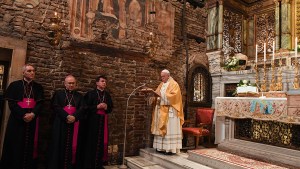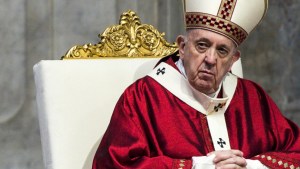Do you spring from bed every morning? Me neither. I was never a “morning person.” However, I’ve noted a shift in recent months as each day begins. Maybe you’ve had a similar experience?
Bishop Sheen spoke of starting the day with, “Good morning, Lord!” or “Good Lord—morning!” There’s a difference between starting the day with prayer and starting the day with, “Now what?” Although I still faithfully pray the Morning Offering, lately, “Now what?” tends to get done first.
I use the excuse that with colleagues across time zones, I must ascertain if a crisis has befallen them even before I silenced my alarm clock. Admittedly, I rush from their messages to headlines, in order to discover whether something horrible has happened (almost always), whether someone who should know better said something painfully stupid (always), and whether there is new evidence to confirm my habitual pessimism and melancholy (inevitably—or so it seems).
The process of starting the day on a downward spiral accelerated a few months ago, driven initially by COVID-19 bursting on the scene, followed by the aggressive and increasingly kinetic loss of civility in my home country. Heading into the fourth month of the Season of Covidtide, now worsened by the eclipse of reason by noise and passion on the streets, I find myself deeply tired—tired into my soul—and sad, sad all the way down to the bottom.
Yet, I am a Christian, one called to serve Christ crucified, risen, reigning, and returning.
Yet, I am a Christian, one called to serve Christ crucified, risen, reigning, and returning. Moreover, I am a priest, ordained to preach the gospel with authority and to administer the sacraments. I am an unworthy steward of the graces of my baptism and ordination if I allow myself to be overcome by sorrow and tempted to despair. What to do? The short answer is: faith, hope, and charity.
The world is intent on denying or distorting faith, hope, and charity, so let’s be clear. Faith is not credulity, which is really gullibility. Faith for a Christian is not only notional but also relational—a relation with the person of Jesus who is the Christ of God. I don’t simply believe about Jesus, I believe in Jesus. He has allowed me to know not only his words but his voice. He and I both insist he is always near me, whether it feels or looks that way to me or not.

Read more:
Pope adds ‘Mother of Hope’ to Litany of Mary, along with two other new titles
Hope isn’t wishful thinking. Saint Paul writes: “For in hope we were saved. Now hope that sees for itself is not hope. For who hopes for what one sees?But if we hope for what we do not see, we wait with endurance” (Romans 8:24-25). Hope is a paradoxical combination of “already” and “not-yet.” Already, Jesus Christ has won the victory, offering us a share in his glory; not-yet is the victory fully realized in our individual lives and creation. We go forward, with him and towards him, as pilgrims to our true home, which begins at the throne of our Heavenly Father.
Charity (or love) is not a warm feeling or even a sustained experience of attraction or desire. True Christian charity is a love that seeks to give rather than take, offers sacrificially, and works for the best for the beloved. And what is best for the beloved is God. There can be peace (defined by Saint Augustine as “the tranquility of order”) only when we order our individual, social and communal lives around helping all to be free from sin and free for God.

Read more:
If you are exhausted, say this prayer to Our Lady to get some rest
Look at the headlines, look out the window, look in the mirror—see much peace? Why not? We suffer from, according to John Horvat, “frenetic intemperance,” that is, a resistance to reasonable restraint and an indulgence of disordered desire. We are like the prodigal son depicted in Luke’s Gospel: “When he had spent everything, a severe famine took place throughout that country, and he began to be in need…” Finally, he comes to his senses, and returns to his father’s house, full of remorse. Only when he returned to his father was he healed and his dignity restored.
Like the son, we must overcome sin: “And rising up, he came to his father.” We must rise against the culture facilitating our ruin. We must respond to our Heavenly Father’s love. The son longed for the father; the father longed for his son even more. If you, like me, wake up sad and tired, it may be because we have lost our way, and therefore must pray for faith, hope, and charity to be renewed in us. Then, gathering what companions we may, we can join the great pilgrimage heading towards our Father’s house, where, already, a banquet is prepared for us.
When I write next, I will speak of perseverance. Until then, let’s keep each other in prayer.

Read more:
Complaints change nothing: Pope’s forceful homily for Sts. Peter and Paul (full text)

